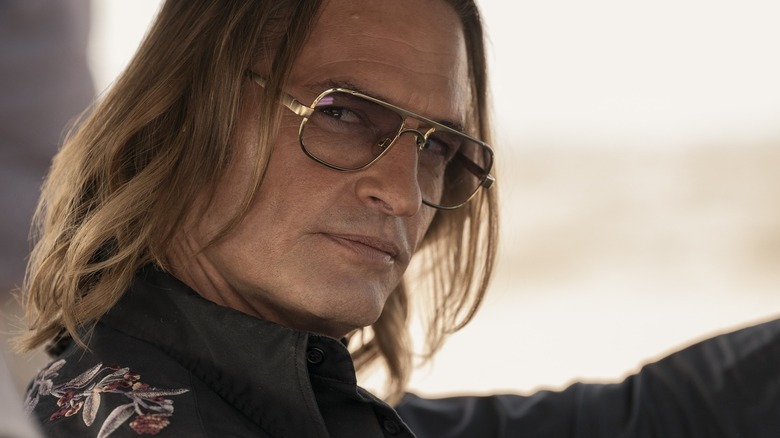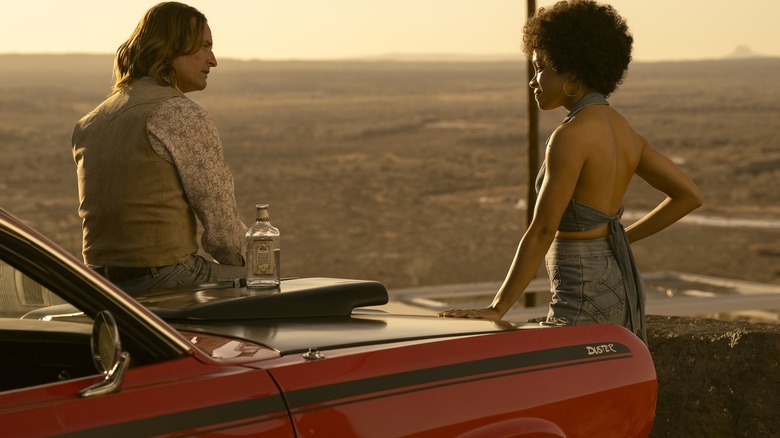Why Josh Holloway's Duster Was Canceled By HBO Max
Josh Holloway's distinctive red Plymouth has driven its last joyride. "Duster," the 1970s-set series by creators J.J. Abrams and LaToya Morgan focusing on getaway driver Jim Ellis caught up in a crime syndicate and FBI agent Nina Hayes (Rachel Hilson) tasked with taking it down, was officially canceled by HBO Max (formerly Max, which was formerly formerly HBO Max — it was a whole thing) before the dust had even settled on last week's season finale. The show marked a long-awaited reunion between Holloway and Abrams, both of whom worked together on the hit ABC series "Lost," as well as Abrams' first significant project since "Star Wars: The Rise of Skywalker" hit theaters in 2019. Incredibly enough, it also represented the only actual title to come to fruition from Abrams' and his production company Bad Robot's lucrative first-look deal with HBO announced back in 2020. The high-profile casualties in that deal included the likes of "The Shining" spin-off "Overlook," "Justice League Dark," and the wildly expensive "Demimonde."
The cancelation of "Duster," reported by Deadline, resets that counter all the way back to zero ... and, unfortunately, the news comes as little surprise to those who've been closely following along. Even fans of the show would have to admit that, despite the fantastic ensemble cast and the well-written story, it struggled to gain much traction with general audiences. Anecdotally, any mention of the show among (for lack of a better word) "normies" was typically met by blank stares or surprise that they'd never even heard of this production before. As it turns out, that's exactly what led to its demise. The report cites its poor performance on both Luminate and the Nielsen ratings, with the show ultimately unable to survive its flagging viewership.
The worst part of it all, of course, is that "Duster" was only just getting started. Season 1 told its story to completion, charting the uneasy alliance between Ellis and Hayes during their attempts to find the truth behind a pair of murders that hit far too close to home, respectively. What Abrams and Morgan intended to come next, however, would've been nothing short of appointment television.
Duster would've had the wildest second season we've seen in years
Oh, what could've been. In an alternate universe, "Duster" ended up flying high on the strength of its "Lost" appeal and justified several return visits to this gorgeously-rendered crime drama set in the 1970s American Southwest. As much as car enthusiasts can appreciate the sheer horsepower on display between Jim Ellis' eponymous red Duster and Nina Hayes' baby blue Plymouth Belvedere II (for more gearhead nerdery, check out writer Priscilla Page's extensive deep dive over at Hagerty), it was the colorful characters and twist-ridden plot that kept viewers coming back. Throughout its debut season, "Duster" followed FBI Agent Hayes as the agency's first Black woman during her dogged quest to bring crime boss Ezra Saxton (a perfectly-cast Keith David) to justice for the killing of her father. Luckily, her ideal "in" to the organized criminal operation just so happens to be Jim Ellis, a low-level driver whose brother died under mysterious circumstances while working for Saxton. Convinced that there was more to this than meets the eye, Ellis begrudgingly turns into Hayes' confidential informant and the pair set out to find the truth.
As much as this setup fueled the main narrative drive for the season, the finale goes out of its way to tee up a new storyline that would truly kick things into overdrive. Throughout their investigations, Ellis and Hayes get roped into the margins of ongoing conspiracies involving none other than wealthy and paranoid recluse Howard Hughes (a scenery-chewing Tom Nelis), Richard freaking Nixon (Paul Wilson), and eventually the missing Oval Office tapes at the heart of the Watergate scandal. And if that weren't enough to keep us occupied? Like any good J.J. Abrams show, the finale throws a major swerve at us revealing that Jim's late brother, whose shadow looms so large over the overarching story, is actually alive — and that he's more important in world affairs than they could've ever imagined.
Best of all, though, the season concludes with the implicit promise of one-time enemies Ellis and Hayes teaming up properly to get to the bottom of, well, everything. This dynamic is what the entire show has been building up to, and it's a crying shame we'll never see this partnership — or the overall series — live up to that potential. We'll just have to imagine what "Duster" could've been.

